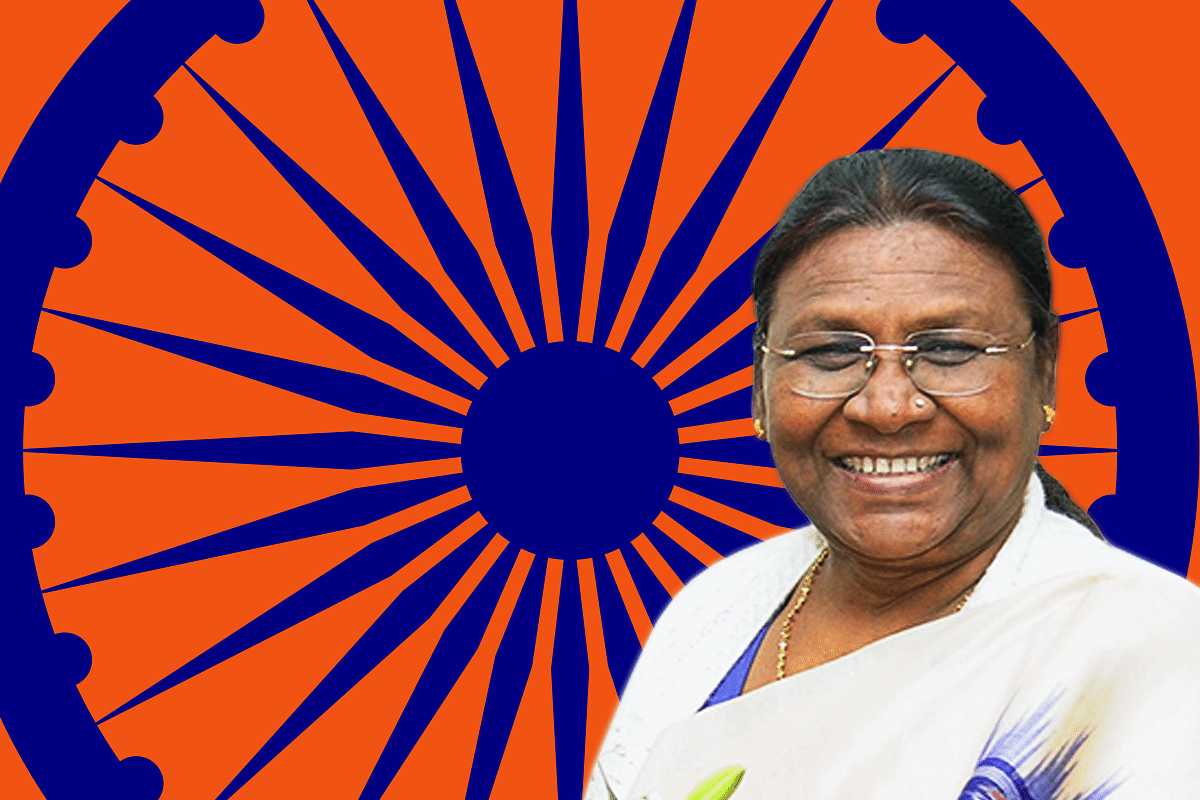Context
History Scripted As President Droupadi Murmu Assumes Office

President Droupadi Murmu
It was a momentous day as Droupadi Murmu, hailing from the Santhal tribe of eastern India, took oath as the fifteenth President of India.
Context: Only the second woman after Pratibha Patil and the first tribal person to become the head of the Indian state, Droupadi Murmu was sworn in on 25 July 2022 by Chief Justice of India N V Ramana.
Protocols and conventions were visible all through the day.
President-elect Murmu offered her respects at the Rajghat early in the day.
Accompanied by outgoing President Ramnath Kovind, she was escorted to the Parliament by the horse-mounted President's bodyguards.
Later, Murmu and Kovind left the Parliament together, after which, as per convention, she accompanied Kovind to his new residence at Janpath.
For the swearing in, several dignitaries including former president Patil, Vice President M Venkaiah Naidu, Prime Minister Narendra Modi, Lok Sabha Speaker Om Birla, union ministers, governors, and other dignitaries were present.
Inspirational rise: President Murmu said that her election to the top constitutional post proves that in India the poor can not only dream but also fulfil their aspirations.
"Reaching this office is not my personal achievement but that of all the poor people in the country," Murmu said.
It is the power of India's democracy that a girl born in a poor tribal home could reach the top-most constitutional post, the President added.
She stressed on speeding up efforts to meet the expectations that the freedom fighters had from the citizens of independent India.
The civilisational significance of Droupadi Murmu reaching the highest office cannot be over-emphasised.
Murmu is the personification of an emancipatory process that is civilisational.
In societies around the world, forest-dwelling communities were considered as primitive and barbaric.
However, in India, they've always been recognised as venerable sources of natural knowledge. They have been considered sacred.
The Hindutva movement's goal to politically empower the poor, deprived, and the vanvasi community (forest-dwelling community) is not new.
It has always stood for integration and goodwill among the various sections of society, which today has resulted in Murmu reaching the Presidency in India.
Even during the Janata Party's government in 1977, the RSS's choice for the post of prime minister was Babu Jagjivan Ram.
In 2012, when the NDA was in opposition, their candidate for presidency was Purno Agitok Sangma.
Troubled history: Colonialism and evangelism brought in a narrative whereby vanvasis were categorised as Scheduled Tribes or 'adivasis', meaning aborigines.
During colonial times, this meant they were 'primitive people' and had to be civilised.
Getting 'Hinduised', according to colonial sociology, meant getting absorbed in the last rungs of the varna system or getting humiliated in the out-of-varna social space.
Common ground was achieved when both Gandhi and Savarkar emphasised that the tribal communities have always been a part and parcel of Hindu civilisation.
They form one of the core components of Dharma.
Gandhi insisted that tribal communities be reached out to on the basis of pan-Indian civilisational unity.
Collaboration: There have been instances where Savarkar and Gandhians collaborated in this regard.
Thakkar Baba (1869-1951): In 1943, the renowned Gandhian who had been working for tribal welfare came together with Veer Savarkar to create schools for tribal children.
‘Vanyogi’ Ramakant Keshav Deshpande (1913-1995) started the Vanvasi Kalyan Ashram (VKA) in 1952. The VKA has been constantly striving to bring together the forest and non-forest communities without compromising on social justice.
Damodar Ganesh Bapat (1935-2019), who started his social service life at the VKA, went on to dedicate his life to the eradication of leprosy in tribal areas.
History created: At a time when a dynamic woman leader belonging to the Scheduled Tribe of Odisha reaches Raisina Hill, the nation should start working towards bringing the benefits of government schemes to every tribal person.
Only then will the nation have succeeded in making the Azadi Ka Amrut Kaal effective for all Indians.
Introducing ElectionsHQ + 50 Ground Reports Project
The 2024 elections might seem easy to guess, but there are some important questions that shouldn't be missed.
Do freebies still sway voters? Do people prioritise infrastructure when voting? How will Punjab vote?
The answers to these questions provide great insights into where we, as a country, are headed in the years to come.
Swarajya is starting a project with an aim to do 50 solid ground stories and a smart commentary service on WhatsApp, a one-of-a-kind. We'd love your support during this election season.
Click below to contribute.
Latest